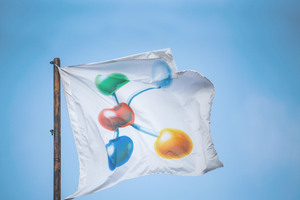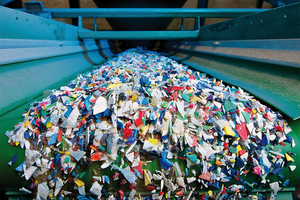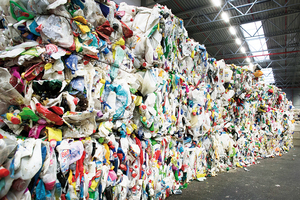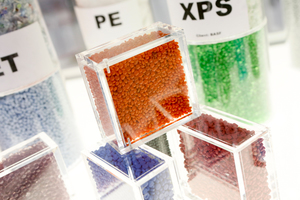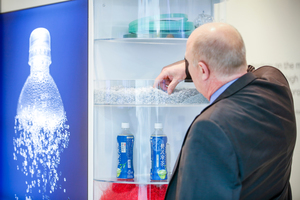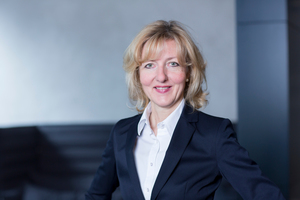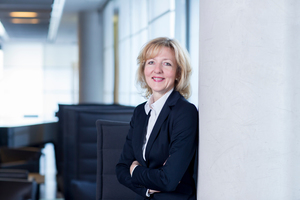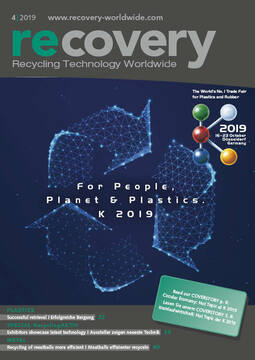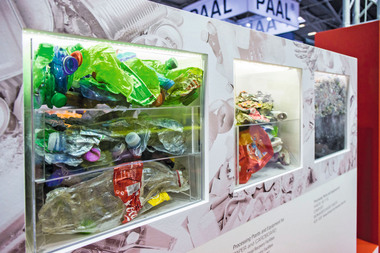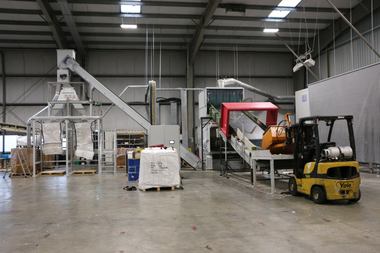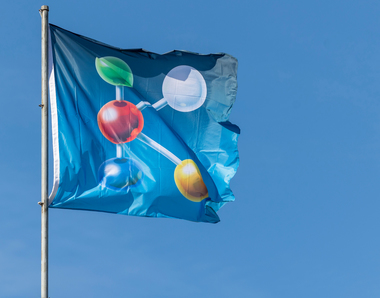Circular Economy: Hot Topic at K 2019
Plastic products have become an integral part of almost every area of life. For good reason. Plastic packaging extends the shelf life of food, plastic parts in cars reduces their weight and CO2 emissions. In medicine, plastics ensure maximum hygiene standards and make medical products safe. Despite its many advantages, this important raw material has come into disrepute for some time now – because of the plastic waste that pollutes entire regions and floats in huge carpets on the world’s oceans. But this problem can be solved. As the concept of “circular economy” plays a central role in this, it has become a hot topic at K 2019, the world´s flagship fair for plastics and rubber, which will be hosted from 16 to 23 October 2019 in Düsseldorf/Germany.
About seventy years ago, plastics became a mass product. The University of California estimates that about 8.3 billion tons of plastics have been produced since then. Particularly in the wake of the strong population growth in many parts of the world, plastics production rates have shot up in recent times. The survey shows that the figures rose sharply: from 2 million tonnes of plastics produced in 1950 to 348 million tonnes in 2017. Accordingly, we have witnessed a substantial rise of plastic waste and we are faced with an urgent question: how to manage plastic waste sensibly? Two pressing problems are at the root of this complex challenge: littering and the unrestricted use of resources, which not only damages the environment but also slows economic growth.
Tackling the problem
Many countries have now realized that they need to change their approach if they want to harness the undeniable benefits of plastic products for years to come. In its plastics waste management strategy presented in 2018, the EU has shifted its focus to the recycling sector. In China‘s current five-year plan, circular economy is postulated as a goal. Countries such as India and Indonesia have declared war on plastic waste pollution. There are also approaches to a cycle in Africa, for example in Nigeria. Because criticism of plastics has also been growing among consumers in many places, a whole series of international brand manufacturers have already committed to the cause and adopted their own recycling strategies. Companies such as Coca-Cola, Ikea, Kraft Heinz or Adidas have promised to increase the proportion of recycled plastics in their products or their packaging in the future or – as in the case of Chinese Gree Electric Appliances, one of the largest manufacturers of electronic domestic appliances in China – have vowed to make their products completely recyclable.
Many factors come together
However, the implementation of a circular economy is still very much in its infancy. Many prerequisites still have to be met. First of all, we need waste collection systems. If used plastics are to be recycled, a sufficient quantity must be available. At present, there are various different recycling systems established in many countries throughout the world. In Germany, for example, there are deposit systems for PET bottles or models that coerce the industry and retailers to participate in the financial costs of packaging collection. They are all based on the idea that plastic waste is a valuable asset worth collecting. Product design is also important. So far, the main focus has been on functionality and, in the case of consumer goods, appearance. In the future, recyclability should become an important aspect that comes into play in the early product development stages.
Recycling is another core component of any circular economy. We need technologies that allow cleaning, segregation, shredding and pelletising of used plastics to ensure that it is ready for reuse in the production of plastic parts. Many of these technologies already exist. However, the quality of the recycled material often poses a problem. Only pristine recycled material is suitable for the production of high-quality plastic parts. In practice, however, it is virtually impossible to predict the purity of secondary material generated from recycled plastics. This is why Thorsten Kühmann, Managing Director of the Plastics and Rubber Machinery Association of the VDMA, proposes the introduction of standards for recycled materials. “So far, no one who uses recycled materials knows what quality they will receive. This makes the processes less reliable, because production cannot be influenced as much as when standardized virgin material is used. Standardised recycled material would be much more acceptable.“ In any case, the cleaner the plastic waste, the easier it can be re-processed into high-quality plastic pellets. Many experts therefore advocate separate collection systems to ensure that different plastics need no longer be separated by the recycling company, which in itself wastes a lot of water and energy.
Networking required
Networking waste management and recycling with production is a core aspect of the circular economy concept. At present, this part of the process is still in its infancy. „The main problem are various players and groups, which obstruct the introduction of a functioning circular economy,” Henning Wilts, expert for Circular Economy at the Wuppertal Institute for Climate, Environment and Energy explains. He identifies a lack of cooperation to promote a cross-company network of collection, recycling and production. There is little to no exchange of data among companies. For example, at present, producers have no way of knowing which polymer material the recycler is generating at any given time, which means that they cannot plan with any certainty the quantities they will receive. Also, the individual areas of the cycle are usually subject to completely different legal regulations. „The systems have developed separately over decades. Bringing them together is a major challenge,“ Wilts concludes.
Nevertheless, removing obstacles is a worthwhile effort, not only because it helps us protect the environment and promotes resource conservation. The EU Commission also maintains that a circular economy for plastics will improve competitiveness and therefore considers it a very real economic benefit. Wilts: „If we succeed in establishing a closed-loop economy, its massive cost-efficiency would encourage other countries to follow suit.” The first country to successfully implement a circular economy will become the role model for everybody else. Retaining the value of plastics by reusing it and treating it as a resource is also a convincing argument for those countries and regions that are only beginning to be faced with the problems of plastic waste.
Not all plastics can be recycled in an economically viable way, and not all used plastics find their way back into the cycle. But these materials can also be useful. Thermal recovery, i.e. incineration, of this group of plastics, for example, can save the fuel required by cement plants. In this application, plastic as a basic material is used at least a second time.
All experts agree on one thing: sustainable, global change and the successful and permanent implementation of a circular economy requires support and cooperation along the entire value chain, from the material manufacturer to the end consumer. Sustainable behaviour begins at home and at school.
People need to be made aware of the value of plastics across all nationalities, age groups and social groups. But a high level of commitment from politicians and legislators is also essential. Protectionism, which only takes into account one‘s own national interests and a restricted number of influences connected with trade policy, will neither help to implement appropriate measures nor promote a general rethinking process.
Some positive initiatives are already underway: The Member States of the European Union are obliged to achieve a collection rate of 90 % for disposable plastic bottles by 2025. However, much more tangible measures are required, such as setting margins for the use of recycled material in production or defining a fixed amount of electricity that must be generated by plastic waste incineration.
At K 2019 in Düsseldorf, the subject of recycling management will not only cover a large amount of space at the exhibitors‘ stands, but will also feature prominently in the supporting programme. For example, the circular economy will be the dominant topic at the „Plastics Shape the Future“ special presentation hosted by PlasticsEurope, and the VDMA will organize the „VDMA Circular Economy Forum“ for K 2019. At the entrance gates to K 2019, the „Touch Points Circular Economy“ will attract the trade visitors’ attention to this topic and point out relevant exhibits in the various halls.
↓
Interview for „recovery“ with Petra Cullmann,
Global Portfolio Director Plastics & Rubber, Messe Düsseldorf
recovery: The K 2019 – What is the fair‘s main purpose, and to whom is it addressed?
Petra Cullmann: The K, held in Düsseldorf, is the world‘s most important forum for the plastics and rubber industry. Every three years, exhibitors and specialist visitors from all continents converge on Düsseldorf to experience live the latest developments in this dynamic and innovative sector. They use the potentials which the K event presents: an indispensable meeting point for innovations and future perspectives, a unique opportunity for interchange of information and for networking, a business platform for innovation and investment. This is true not only of the manufacturers of plastic and rubber products, but also of industrial end customers, who regularly visit the K looking for inspiration for their industry and their products. Nowhere is the range of world premieres as large as at the K in Düsseldorf.
recovery: The first K was held in 1952. Could you, perhaps, tell us a little about the history and development of this fair?
Petra Cullmann: In 1952, the German plastics industry was in its infancy, and the age of production of mass plastics was just dawning. In the course of the triumphal march of plastics and their conquest of practically all sectors of modern life and innovative technologies, the K also evolved from „The miracle of plastics“ – this was the motto of the 1952 K – to the Number 1 in its sector, and into a global market for plastics and rubber. Some 270 exhibiting companies, all from the then young Federal Republic of Germany, participated in this premiere fair in 1952, held on around 14 000 m² of net exhibition space. The K was, initially, purely a German industry show for all interested visitors, whether laypersons or specialists. The focus of interest was on things which were intended to make everyday life nicer and easier. The great break came in 1963: the K was transformed into a purely technical trade fair with an international character for experts from the plastics and rubber industries and from the industries using these products. The K in Düsseldorf is now the undisputed lead fair in its field, and is clearly distinguished, as the market leader, from its competition. The last K, held in 2016, welcomed 3293 exhibitors from sixty-one countries, on more than 173 000 m² of net exhibition space, and also 232 053 specialist visitors, of whom 71 % came from abroad.
recovery: How has the number of exhibitors and visitors evolved during the past ten years?
Petra Cullmann: If we look at the last five K events, from 2004 to 2016, that is, then the number of exhibitors has again increased greatly, up to the 3293 companies we have already mentioned. The number of visitors has remained constantly high during this time, amounting to more than 200 000 specialist visitors to every fair. The internationality of the visitors again increased significantly between 2004 and 2016: in 2004 our visitors came from 105 countries, whereas people from a total of 161 countries came to Düsseldorf for the last K.
recovery: Plastics – there is heated discussion of their use at present, but they are nonetheless an indispensable part of our lives. What are the focal topics of this year‘s K?
Petra Cullmann: The four leading topics for the 2019 K are: Plastics for Sustainable Development & Circular Economy, Digitalization/Plastics Industry 4.0, System Integration: Functionality achieved via Materials, Processes and Design, and Recruitment for the industry. These lead subjects were defined by the scientists and experts in the K 2019 Innovation Group. Even now, these „hot topics“ on //www.k-online.de" target="_blank" >www.k-online.de:www.k-online.de are also being displayed on our own microsites, which are continuously being filled, until the fair starts, with video interviews, specialist articles and news on the particular subject areas, and thus provide an ideal introduction to the fair for our visitors. While the fair is open, these subjects will then be found not only on the exhibitors‘ stands, they will also play an important part in the side-events program for the K.
Particular attention is focused here on the topic of the „Circular Economy“, since that is the watchword of the hour: here resources are continuously used for as long as possible, maximum possible value is extracted from them during their period of use, and at the end of that period, the products or the material are recovered. There are many preconditions which must be met for the circular economy to function properly, however. There must, firstly, be appropriate collecting systems. Another core component of every circular economy is then recycling and technologies which make it possible to clean, sort and shred used plastics and convert them back to plastic granules again. The quality of the so-called recyclate continues to be a problem in many cases. The main hurdle for a functioning circular economy is still at present the various players, however, and the fact that the individual sectors of the circuit are generally subject to totally differing legal regulations. These systems have evolved separately across decades and it is now a great challenge to bring them together.
The exhibitors, and also the various Specials at 2019‘s K, will be showing what is already possible and what the industry is working on in interaction with the most diverse range of institutions, such as, for example, the special „Plastics Shape the Future“ show presented by the VDMA (German Engineering Federation) Forum. The „Touch Points Circular Economy“ will already be raising the awareness of technical visitors for this topic in the entrance areas of the K 2019.
recovery: What will be the highlights at this fair? What should no visitor miss under any circumstances?
Petra Cullmann: I would most warmly recommend to everyone a visit to the special „Plastics Shape the Future“ show. This – for no less than the tenth time – augments the already extensive range of features at the K, in the form of a central forum for the interchange of information, thoughts and opinion for both specialist visitors and the media. The focus here will be on the innovative powers of plastics – and of the industry – in terms of conservation of resources, digitalization, renewable energy and sustainability. The central element of this special show is formed by „subject days“ featuring expert addresses, impulse papers and panel discussions. Experts from science, industry and politics will be providing information on, and then discussing, economic, social and ecological challenges and conceptual solutions. We are also awaiting excitedly the „VDMA Circular Economy Forum“. The VDMA will examine here, on the one hand, the entire circular economy cycle in the plastics industry, starting from production and proceeding via the life-cycle phases of plastic products, up to and including collection, sorting, recycling and subsequent return to the production route. And, secondly, this cycle is also to be made experienceable for our visitors. For this purpose, the VDMA is cooperating at the K 2019 with partners from the entire plastics value chain, in other words, with producers, users and recyclers, and will outline in detail how a closed circuit operates. Last but not least, no one should miss the Science Campus at the K 2019, which exemplifies dialogue between science and industry. Here, exhibitors and visitors will have the opportunity of obtaining a concentrated overview of scientific activities and results in the plastics and rubber sector, and also of exchanging experience between universities and companies.
recovery: What importance will plastics have in the future?
Petra Cullmann: From climate change to digitalization, humanity is confronted with global challenges that can be traced back to human causes. Efficient low-emission and energy-conserving processes and technologies are in greater demand than ever before, as are smart, high-performance materials which can be adapted in an exemplary way to each particular application, without themselves causing excessive burdens. Polymer materials in this context make a valuable and groundbreaking contribution. They convince us even now in practically all applications – as freshness-preserving foodstuffs packaging just as in the generation of eco-electricity and in the reduction of pollutant emissions from road traffic. Plastics and rubber actually make many modern applications at all possible.
Polymer materials, for their part, also confront us with major challenges, such as their ultimate destination and their treatment after use. Plastics and rubber are valuable materials which should be produced in a sustainable manner and which should, ideally, be capable of being reused for the manufacture of high-quality products. This necessitates, however, a material design which in and of itself will assure a high recycling rate and the maximum yield of high-quality recyclates. At the K 2019, the plastics and rubber industry is demonstrating key solutions in all these fields. Recycling plastics are more and more becoming an alternative, and provide an important feed material for new plastic products.
recovery: Where will the K trade fair be heading in future, what is planned?
Petra Cullmann: Our aim, of course, in the future, too, will be to defend the ranking of the K in Düsseldorf as the world‘s most important forum for the plastics and rubber industry. For this reason, we are in permanent two-way communication with the international industry, whether it be with key players, industry associations or science. In addition, we have, via Global Gate, our worldwide network of trade-fair platforms and strategic alliances with leading plastics and rubber fairs, access not only to the most important growth markets around the world, we are, in addition, also continuously monitoring the heartbeat of the industry, around the whole globe. We always align the conceptual direction of the K closely around current circumstances, developments and trends in the industry. This is one of the secrets of the K‘s success, one that we are resolved to continue for 2022.
recovery: Many thanks for the interesting discussion.
K 2019 - At a Glance
Event title K 2019
International Trade Fair
No. 1 for Plastics and Rubber Worldwide
Supporting Organisations Arbeitsgemeinschaft Deutsche
Kunststoffindustrie (AKI)
(Federation of the German Plastics
Industry)
Karlstraße 21
D-60329 Frankfurt
Tel.: +49 (0) 69 / 25 56 13 00
Fax: +49 (0) 69 / 251 060
and the following member
associations:
Gesamtverband Kunststoffverarbeitende
Industrie e.V. (GKV)
(Association of German
Plastics Converters)
Gertraudenstr. 20
D-10178 Berlin
phone: +49(0) 30/206167 150
fax: +49(0) 30/397122 30
Email:
Plastics Europe Deutschland e.V.
Mainzer Landstr. 21
D-60329 Frankfurt/Main
phone: +49 (0) 69 / 2556 1300 + 1303
fax: +49 (0) 69 / 251 060
Email:
Fachverband Kunststoff- und
Gummimaschinen im VDMA e.V.
(The German Plastics and Rubber
Machinery Association within VDMA)
Lyoner Str. 18
D - 60528 Frankfurt/Main
phone: +49 (0) 69 / 6603-1831 + 1832
fax: +49 (0) 69 / 6603-1840
Email:
Wirtschaftsverband der deutschen
Kautschukindustrie e.V. (WdK)
(Association of German
Rubber Processors)
Zeppelinallee 69
D-60487 Frankfurt/Main
phone: +49 (0) 69 / 7936 130 + 131
fax: +49 (0) 69 / 7936 165
Email:
Patronage EUROMAP - European Committee
of Machinery Manufacturers
for the Plastics and Rubber industries
EUROMAP Secretary General
c/o VDMA e.V.
P.O. Box 71 08 64
D - 60498 Frankfurt
phone: +49 (0) 69 /6603 1831 + 1832
fax: +49 (0) 69 / 6603 1840
Organiser Messe Düsseldorf GmbH
PO Box 10 10 06
Messeplatz
D-40001 Düsseldorf
phone: +49(0) 211/ 45 60-01
fax: +49 (0) 211 4560-8563
Email:
Staging cycle Every three years
Show venue Düsseldorf Fairgrounds
Halls 1,3 – 17
Date 16 – 23 October 2019
Opening hours Daily from 10 am - 6.30 pm
Entrance fees the ticket online sale starts in March 2019
A glance back at K 2016 Exhibitors: 3.293 from 61 countries
(1.040 from Germany,
2.253 from other countries)
Net exhibition space: 173.025 sqm
Visitors: 232.053
(29 % from Germany,
71% from other countries)
Main product groups
·Raw materials, auxiliaries
·Semi-finished products,
·technical parts and reinforced
plastics
·Machinery and equipment
for the plastics and rubber industries
·Services for the plastics and
rubber industries

